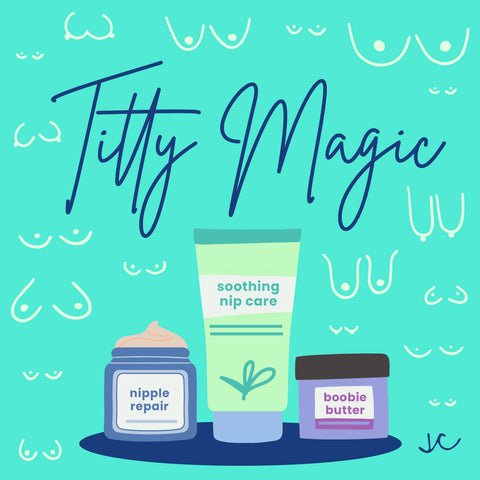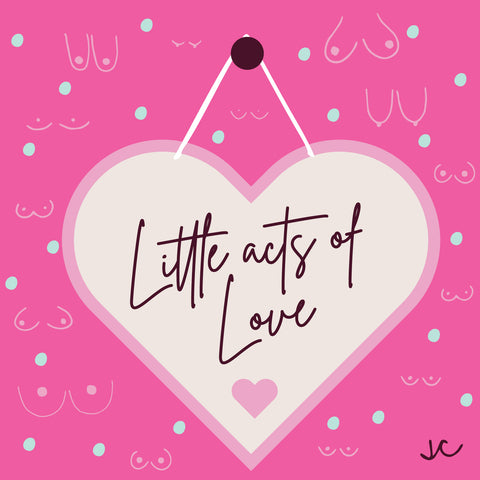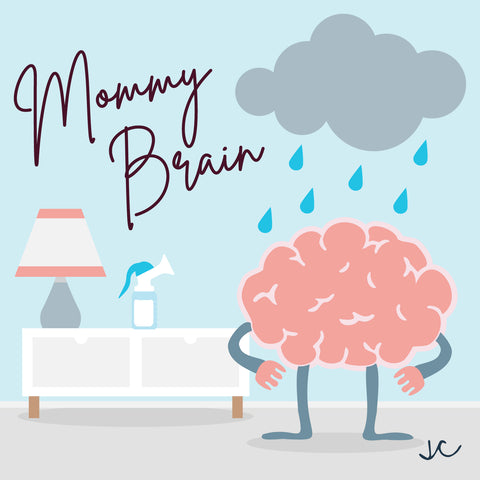Is Caffeine Safe During Pregnancy? What You Should Know About Pregnancy and Caffeine

Estimated read time: 10 minutes
Eeek! I drank coffee while pregnant!
Is that OK? Will my baby be OK?
If you’ve ever had these thoughts after sipping on a delicious cup of coffee or calming mug of tea (preferably from your Titty mug), then sister, you’re not alone.
Is caffeine safe during pregnancy is one of the most-asked questions by coffee-loving mamas, including how much caffeine is in coffee (or tea if that’s your jam), and how much coffee is safe to drink when you’re expecting.
Well mama, before you ditch the java for nine months, we’re here to spill the Tit-tea on coffee, and all things caffeine-related during pregnancy.
Let’s dive in!
How much caffeine is in coffee and tea?
Caffeine isn’t just in your yummy morning oat milk latte. It can be found in a ton of products, including coffee and coffee-flavored foods, tea, energy drinks, soft drinks, and chocolate (ahh…so THAT’s why we’re so addicted to Snickers).
Before getting into the effect of caffeine on pregnancy, and if it’s safe to drink coffee while pregnant, let’s look at the science bit, in particular, how much caffeine is in coffee, tea, and your favorite sodas.
How much caffeine is in coffee?
There isn’t a one-size-fits-all answer here, as there are many factors that affect the caffeine content in coffee. On average, you can expect to get around 95mg of caffeine from an average cup of joe. But this can vary depending on the type of coffee and can range from almost zero to over 500mg.
Some of the factors that affect the caffeine content of coffee include:
- Serving size – a cup of coffee can range from 1-24 oz.
- Roasting – lighter roasts have more caffeine than darker roasts.
- Type of coffee beans – some varieties contain more caffeine than others.
- Type of coffee – caffeine content varies greatly between brewed, espresso, instant, and decaf coffee.
So it’s always worth checking before placing your order at Starbucks.
How much caffeine is in tea?
A lot less than coffee! On average, a cup of black tea has between 14 and 70mg of caffeine, while green tea has between 24 and 45mg.
Steeping time plays its part too, where teas that steep for longer and in hotter water produce a more potent cup containing more caffeine.
Then there are the herbal teas. Delish chamomile, peppermint, fennel, and everything else you can think of. The majority of these are caffeine free.
How much caffeine is in soda?
While the kola nut (which is where cola drinks get their flavor from) does naturally contain caffeine, the majority is added by the manufacturer. Typical cola drinks contain between 30 to 50mgs of caffeine per 12oz, but there are some exceptions.
There are also oodles of caffeine-free sodas available to enjoy.
Is caffeine safe during pregnancy?
OK. So how much caffeine is safe in pregnancy?
After all, if you’re used to guzzling down a few cups of java a day to give you the pep and energy you need, it can be hard to quit cold turkey when you find out you have a bun in the oven…especially when you can feel completely zonked out during those full-on nine months.
The U.S. FDA considers 400mg (about four cups of coffee) to be a safe amount of caffeine for healthy adults to enjoy daily. But this is different for pregnant and breastfeeding mamas, who are advised to limit their intake to 200mg (about one 12oz cup of coffee or up to four 8oz mugs of tea) according to the American College of Obstetrics and Gynecologists (ACOG).
While there’s no conclusive research on what might happen during pregnancy if you consume more than 200mg of caffeine, studies in animals do show an increase in birth defects, miscarriage rates, and low-birthweight babies. Some research has shown that babies born to moms who had more than 500mg of caffeine a day are more likely to:
- Spend more time awake.
- Have faster heart rates.
- Have an increased breathing rate.
Caffeine crosses the placenta into the amniotic fluid, and while you might enjoy the buzz caffeine gives you, your baby’s developing metabolism can’t quite handle it yet.
But if you can’t bare to part with your beloved tea, coffee, or soda, then you don’t need to.
Most experts, including the ACOG and the United Kingdom’s Royal College of Obstetricians and Gynaecologists, agree that moderate caffeine consumption (less than 200mg per day) doesn’t appear to be a major contributing factor in miscarriage or preterm birth.
And please remember mama, if you occasionally have more than 200mg a day, then that’s OK. Just, in general, try and limit your intake or switch to a caffeine-free herbal tea for something new and super tasty.
Is caffeine safe while breastfeeding?
If you’re nursing on demand and feel the exhaustion of being up all night, then there can be nothing more tempting than sipping on a cup of coffee to keep your peepers open.
The good news is, according to experts, including La Leche League, it is safe to consume caffeine while breastfeeding, but, just like in pregnancy, it’s a good idea to limit your intake. Caffeine is a stimulant and can make your baby restless and harder to get to sleep. As it can be passed onto your baby through your milk makers, try to limit your coffee to about three cups (or up to 300mg) a day.
Here’s a Titty tip for you:
According to La Leche League, it takes around one to two hours for caffeine to pass onto your breast milk after you drink it. So it’s a good idea to enjoy your coffee right after you nurse or pump, to give it time to wear off before it’s time to start Boobing again.
How do I cut down on caffeine?
If you fancy cutting down on the ol’ caffeine but need a little help getting there, then we’re here for you mama! If you’re still craving it, then instead of cutting it out completely, try these tips for limiting your caffeine intake.
- Switch from brewed coffee to instant – Instant coffee is slightly lower in caffeine and you can make it lower still but only using half a spoonful (although this will make the taste a little weaker).
- Shorten steep time – If you love a cup of warming tea then try steeping your teabag or tea leaves for half the amount of time.
- Decaffeinated options – Start drinking the decaffeinated versions of your favorite caffeine drinks. There are even caffeine-free versions to try.
- Caffeine-free options – Check out some caffeine-free alternatives such as some herbal teas (although not all are suitable during pregnancy), milk, juice, and sparkling water.
If you’re a caffeine fiend then take your cut down slowly to avoid any withdrawal symptoms. Start by cutting down half a mug a day and go from there.
You’re the Tits!
So remember mama, you don’t need to give up your beloved coffee or tea completely when you’ve got a cute lil’ bun in the oven. Just cut your caffeine intake down to under 200mg – two Titty mugs of tea, two cups of instant coffee, or one cup of filtered coffee – and you’ll get your fix without having to worry about your little one.
At Titty City Design, we believe that every boobie is beautiful, and that should be celebrated. We are a female-owned and operated, small business here to spread self-love and body positivity with our line of boob apparel, boob accessories, and boob-themed decor and products for the home. A portion of our proceeds goes to help support postpartum people and breast cancer patients.
Products that New Moms Love












